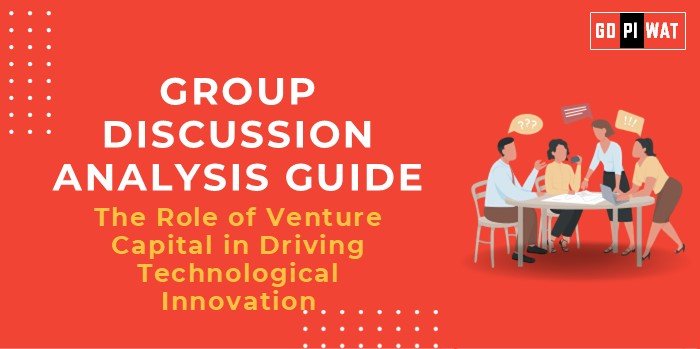📋 Group Discussion Analysis Guide
🌟 Topic: The Role of Venture Capital in Driving Technological Innovation
🌐 Introduction to the Topic
- Opening Context: Venture capital (VC) serves as a key financial engine for startups and technological breakthroughs, driving global innovation and economic progress. Countries like the U.S., China, and India have leveraged VC to foster advancements in areas such as artificial intelligence, biotechnology, and green technology.
- Topic Background: Emerging in the mid-20th century, venture capital has grown into a sophisticated ecosystem enabling entrepreneurs to transform groundbreaking ideas into scalable businesses. Recent trends show that VC funding has become pivotal in addressing societal challenges like climate change and healthcare access.
📊 Quick Facts and Key Statistics
- Global VC Funding in 2023: $445 billion, indicating a surge in innovation-driven investments.
- Share of Tech Sector in VC Investments: 60% globally, highlighting its role as a primary growth driver.
- India’s VC Funding in 2023: $20 billion, focusing on fintech, AI, and renewable energy startups.
- Startups Supported: Over 10,000 globally in 2022, contributing to employment and GDP growth.
🧩 Stakeholders and Their Roles
- VC Firms and Angel Investors: Provide funding, mentorship, and market access.
- Startups: Innovate and scale solutions to modern challenges.
- Governments: Create policies to encourage investment (e.g., tax incentives, regulatory frameworks).
- Academia and Research Institutes: Supply intellectual property and foster entrepreneurial ecosystems.
🏆 Achievements and Challenges
Achievements:
- Economic Growth: Startups funded by VC contributed significantly to GDPs in regions like Silicon Valley and Bengaluru.
- Technological Breakthroughs: Enabled the rise of disruptive technologies like generative AI and autonomous vehicles.
- Employment Creation: Direct and indirect jobs in high-growth startups.
- Sectoral Expansion: Growth in green tech, healthcare, and fintech startups addressing critical global issues.
Challenges:
- Market Volatility: Economic downturns reduce funding availability.
- Overvaluation Risks: Leads to “unicorn bubbles.”
- Geographical Disparities: Concentrated funding in select regions, leaving others underfunded.
🌍 Global Comparisons
- U.S.: Home to Silicon Valley, leads in VC-backed unicorns.
- China: Growing dominance in AI and e-commerce through VC.
- India: Rapidly scaling VC-driven startups in fintech and SaaS.
📖 Case Studies
- OpenAI’s Success: Early VC backing from firms like Khosla Ventures led to breakthroughs in AI.
- BYJU’s (India): Leveraged VC to become the world’s largest ed-tech firm.
🔍 Structured Arguments for Discussion
- Supporting Stance: “Venture capital catalyzes innovation by bridging funding gaps for high-risk, high-reward ventures.”
- Opposing Stance: “The focus on rapid returns can drive unsustainable growth and innovation bubbles.”
- Balanced Perspective: “While VC is instrumental in fostering innovation, it must address challenges like equitable funding and sustainability.”
🎯 Effective Discussion Approaches
- Opening Approaches:
- Data-driven Start: “With $445 billion in global VC investments in 2023, the industry is the backbone of tech innovation.”
- Case Study Introduction: “Consider OpenAI’s journey—from early VC funding to revolutionizing AI.”
- Counter-Argument Handling: Highlight gaps in geographic or sectoral funding and propose solutions like global VC funds.
🛠️ Strategic Analysis of Strengths and Weaknesses
- Strengths: Innovation funding, job creation, ecosystem growth.
- Weaknesses: Overvaluation, market concentration.
- Opportunities: Green tech, AI/ML integration.
- Threats: Economic downturns, regulatory uncertainties.
📚 Connecting with B-School Applications
- Real-World Applications: VC-backed innovation impacts sectors like healthcare, fintech, and green technology, offering scope for MBA projects in venture funding or entrepreneurship.
- Sample Interview Questions:
- “How does VC funding shape the startup ecosystem?”
- “What are the risks associated with overvalued unicorns?”
- Insights for B-School Students:
- Recognize the dynamics of risk capital.
- Understand startup funding lifecycles.
- Leverage sectoral trends like AI or clean energy for projects.


